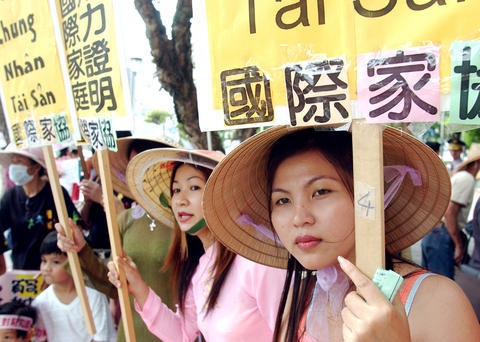Holding a banner reading "UN for Taiwan" in front of the Executive Yuan, hundreds of foreign spouses yesterday expressed their doubts over the country's qualifications to be accepted by the world body because of its record of discrimination against immigrants.
They urged the government to scrap regulations that require foreign spouses of Taiwanese applying for naturalization to meet minimum financial requirements.
"A country without human rights is not entitled to enter the UN. Give [immigrants] back [their] basic human rights before talking about UN membership," Hsia Hsiao-chuan (

PHOTO: PATRICK LIN, AFP
When applying for citizenship, foreign spouses must meet health examinations requirements, have been in the country for a minimum period of time, relinquish their original citizenship, meet financial qualifications and pass a Chinese-language test.
As proof of their financial status, the Immigration Law (移民法) requires that applicants prove they can earn at least double the minimum wage -- or NT$410,000 (US$12,000) a year -- or have the same amount in deposits.
"The reason to abolish financial proof is simple enough. It is discrimination and it is against human rights," said Hou Hsiao-hsien (
Liao Yuan-hao (廖元豪), a law professor at National Chengchi University, slammed the rationale behind a policy that says immigrants who unable to prove their financial ability would be a financial burden to the country.
"Didn't our ancestors come to Taiwan from impoverished China without financial proof? To discriminate against new immigrants based on their financial status is to discriminate against our ancestors," Liao said.
"If the government worries immigrants cannot get by without financial proof, it should grant immigrants the right to work in the country and [provide] social relief programs," Liao said.
Liao was referring to the fact that foreign spouses are prohibited from working and are not covered by social relief programs before receiving citizenship.
Yuan Hsiao-li (袁曉麗), a Chinese national who married a Taiwanese three years ago, said she encountered limitations on so many levels while living in Taiwan.
"Taiwan is a country that often takes pride in the value of freedom and democracy, but I don't feel that the government treats us in an open and tolerant manner," she said.
The protest was organized by the Coalition against Financial Requirements for Immigrations and supported and dozens of civil organizations including the Association to Promote Marriage Across the Strait, the Hope Workers' Center and the TransAsia Sisters Association.
They also staged a protest outside the National Immigration Agency and vowed to launch a massive demonstration should the government fail to positively respond to their demands by the Mid-Autumn Festival on Sept. 25.

Aftershocks from a magnitude 6.2 earthquake that struck off Yilan County at 3:45pm yesterday could reach a magnitude of 5 to 5.5, the Central Weather Administration (CWA) said. Seismological Center technical officer Chiu Chun-ta (邱俊達) told a news conference that the epicenter of the temblor was more than 100km from Taiwan. Although predicted to measure between magnitude 5 and 5.5, the aftershocks would reach an intensity of 1 on Taiwan’s 7-tier scale, which gauges the actual effect of an earthquake, he said. The earthquake lasted longer in Taipei because the city is in a basin, he said. The quake’s epicenter was about 128.9km east-southeast

GENSLER SURVEY: ‘Economic infrastructure is not enough. A city needs to inspire pride, offer moments of joy and foster a sense of belonging,’ the company said Taipei was named the city with the “highest staying power” in the world by US-based design and architecture firm Gensler. The Taiwanese capital earned the top spot among 65 cities across six continents with 64 percent of Taipei respondents in a survey of 33,000 people saying they wanted to stay in the city. Rounding out the top five were Vietnam’s Ho Chi Minh City (61 percent), Singapore (59 percent), Sydney (58 percent) and Berlin (51 percent). Sixth to 10th place went to Monterrey, Mexico; Munich, Germany; Sao Paulo, Brazil; Vancouver; and Seoul. Cities in the US were ranked separately, with Minneapolis first at

The New Taipei City Government today warned about the often-overlooked dangers of playing in water, and recommended safe swimming destinations to cool off from the summer heat. The following locations in the city as safe and fun for those looking to enjoy the water: Chienshuiwan (淺水灣), Baishawan (白沙灣), Jhongjiao Bay (中角灣), Fulong Beach Resort (福隆海水浴場) and Sansia District’s (三峽) Dabao River (大豹溪), New Taipei City Tourism and Travel Department Director-General Yang Tsung-min (楊宗珉) said. Outdoor bodies of water have variables outside of human control, such as changing currents, differing elevations and environmental hazards, all of which can lead to accidents, Yang said. Sudden

Tropical Storm Podul has formed over waters north-northeast of Guam and is expected to approach the seas southeast of Taiwan next week, the Central Weather Administration (CWA) said today. The 11th Pacific storm of the year developed at 2am over waters about 2,660km east of Oluanpi (歐鑾鼻), Pingtung County — Taiwan's southernmost tip. It is projected to move westward and could have its most significant impact on Taiwan on Wednesday and Thursday next week, the CWA said. The agency did not rule out the possibility of issuing a sea warning at that time. According to the CWA's latest update, Podul is drifting west-northwest